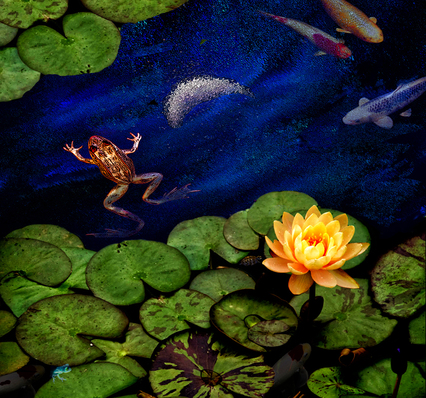Pond Life
In the darkness of night, the quiet pond comes to life and the frogs begin their croaking.
Can you sound like a frog? What colors, besides brown, can frogs be?
Can you find the blue frog?
Can you sound like a frog? What colors, besides brown, can frogs be?
Can you find the blue frog?
A pond is a small, still, shallow body of water. Because it lacks a current, the pond's calm nature is ideal for many forms of life to thrive. Most frog species spend life near water, in a pond, river bank, quiet stream or even puddle. There they lay eggs from which tadpoles, or polliwogs, are born. Depending on the species, a tadpole can take anywhere from a few months to years to fully develop into a frog. Pond life, while it has its dangers, is an amiable ecosystem in which our polliwog friends can mature. Once these amphibians have morphed into their second life as frogs, they tend to stay near a water source. Some even migrate, returning to the same pond they were born in to lay their offspring.
It is vital that a frog's skin remain moist, as it is one of the ways they breath. Not all frogs are nocturnal, but the ones that are use the humidity and cool night temperatures to help retain moisture. Frogs do not drink water but absorb it through their skin which makes them more susceptible to the toxins in the water. Insects, a major part of the frog's diet, are in abundance at night, and the frogs take full advantage, sitting perfectly still as they wait for dinner to come their way.
It is vital that a frog's skin remain moist, as it is one of the ways they breath. Not all frogs are nocturnal, but the ones that are use the humidity and cool night temperatures to help retain moisture. Frogs do not drink water but absorb it through their skin which makes them more susceptible to the toxins in the water. Insects, a major part of the frog's diet, are in abundance at night, and the frogs take full advantage, sitting perfectly still as they wait for dinner to come their way.



